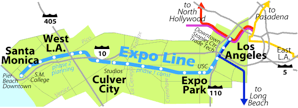Santa Monica
Kevin McKeown
Councilmember





No other single change will affect Santa Monica’s future more than Expo Light Rail. Where do we want the tracks?
What about residents, if Santa Monica is forced to accept a quasi-industrial rail yard in our Pico neighborhood?
Many of us in Santa Monica feel overwhelmed by
chaotic changes that threaten to ruin the
character, livability, and affordability of our neighborhoods.
Working with residents, I’ve been able to identify and correct some of the worst impacts on our quality of life. I’ve led Council actions to substantially reduce allowable lot coverage, height, and other development allowances in multi-family neighborhoods, and also to protect single-family areas against “monster mansions.” This assures that new construction will maintain the scale and character of the neighborhoods we love.
When residents are riled about overdevelopment, they turn to their elected Councilmembers. I’m considered to be one of the most “slow-growth” on our City Council, but real changes in policy and practice take four votes out of the seven Councilmembers. I would say we haven’t yet done enough to protect our neighborhoods.
(Don’t forget that any TV set graphic on my website links to a video!)



Why would the Expo Authority put a maintenance facility next to people’s homes? Were the right criteria used?
Now that the regional Metro board has forced a rail yard on our Pico neighbors, how do we protect nearby families?
While better mass transit is a big part of our Santa Monica future, we must be wary of letting developers’ dreams get ahead of the reality. Too many “development agreements” are jockeying for early approval, years before light rail arrives. Santa Monica deserves true transit-oriented improvements, not merely transit-anticipatory development.
Dependable regional rail transit that takes cars off the road and guarantees mobility, no matter how gridlocked the freeway may become, is essential to our quality of life in Santa Monica. Without it, we risk becoming prisoners to Westside traffic. Every day Santa Monica swells from 90,000 to an estimated 250,000 people, and having fewer of those commuters come by car can only be good for those of us who live here.
Santa Monica was inappropriately blindsided by the Expo Line maintenance yard siting. A quasi-industrial facility immediately adjacent to a residential neighborhood simply showed up unheralded in an Expo Authority environmental impact document, with, tellingly, the Pico neighborhood edited out of the diagram. Clearly, the decision was made before we were even warned it was being considered, and the best we have been able to do on behalf of our residents is seek mitigations for the very considerable impacts. We can only hope the funding doesn't run out before the neighborhood protections are put in place.
Santa Monica and all of the Westside need far more than Expo to restore access and mobility. The new Expo stations must become multimodal hubs for shuttle buses and bikeways. The eventual Subway to the Sea will be far from redundant; it will help remedy many decades of insufficient regional transit planning.






























We just adopted a new Land Use and Circulation Element, or LUCE. Any plan that takes six and a half years to complete clearly involves lots of review and negotiation. I voted to adopt the final LUCE because, in the end, it contained far more consensus than compromise.
I was the only Councilmember to vote against all the height increases, and that was based on overwhelming resident input to keep Santa Monica human-scaled. The last-minute increases of up to eleven feet made the height in one area greater than anywhere in the old 1984 general plan, after we were asked by the public to reduce heights. The good news is that height alone doesn’t increase traffic.
Traffic congestion is a major concern for Santa Monica, as is available affordable housing. I would have preferred a LUCE that more strongly favored residential uses over commercial uses, which can generate three times the traffic attributable to housing. The Council majority overrode my motion to build more housing than commercial in the new "mixed-use creative" district, and I wanted, but could not get, stronger wording to make sure that the upper floors of new developments along our boulevards would be reserved for housing, some of it deed-restricted for affordability.

Taking a broad view of opportunities and challenges for the next twenty years or more, the LUCE is a visionary integration of land use, mobility, and sustainability. The new LUCE redirects development out of established neighborhoods, better protecting residents from evictions, demolitions, and relocations. That’s why, despite my concerns about heights, and about commercial growth versus housing production, I voted for it. In the coming months, the Council will be writing new zoning code to implement the LUCE principles. Your continued involvement in this process to decide how our city will look and function is crucial! Dates of ongoing meetings are here.
Elect Kevin again, in 2010: Re-election campaign site















